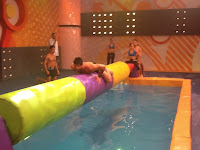
A new craze has swept Costa Rica in the unlikely colors of blue and orange. Few and far between are the schools where breathless chants of 'A-a-azuul' and 'naran-ja, naran-ja' do not fill the air as rival bands of students act out the feats they saw the night before on TV. The source of this color-borne enmity is a weeknight (two hours a night, Monday-Friday) television program called Combate that is currently outperforming the nightly news and various novelas and gameshows on both of Costa Rica's major stations. The show features two teams of contestants who gather points every night in various contests of fitness and agility. The two teams are (you guessed it) orange and blue and have six members each, three men and three women. The contestants are fit, attractive, and dressed in spandex which alone is probably responsible for its popularity. Each team has its own song, its own dance, and its own captain, and every two weeks one person is voted off one team only to be replaced the very next day by a new recruit.

One contest they do almost every night is called 'cilindros' and the contestants have to move above a pool across large cylinders that spin and frequently send people splashing into the water. The contest that is most frequently acted out a school is 'resistencia' where four contestants interlock their bodies and have to remain suspended on each other's laps with only their legs touching the ground as chairs are removed, and stay for at least 3 minutes. I was quite thrilled when a group of 5th graders (including my host niece) beat the sixth graders at one of my schools before that particular contest was banned.

In my host family my host niece immediately picked the blue team, while my host sister and the indigenous students picked orange. My host parents were loath to take sides in the beginning, but the blue team has won them over as well. The entire country is polarized, the kindergarten teacher at school recently lined up all her students and had them do the Blue team's dance, until several of the little kids rebelled and ran across the schoolyard to do the orange dance. Every night my host niece gets excited, asking me every couple of minutes what time it is, so that she can change the channel to Combate before my host father turns the news on. I have found that knowing the names of the contestants on Combate has given me a lot more credibility with my students, and armed me with a constant topic of conversation at recess, which has been instrumental in establish rapport and keeping class going as the school year collapses around us.
What makes the show interesting for me is how openly and artlessly it addresses itself as a reality-tv show. When the captain of the Orange team was growing too belligerent they switched the team's captains, thereby shaking many people's loyalty. A large number of people had joined the blue team precisely because the orange team's captain was so unpleasant. Now they found themselves having to support the person they hated, or admit to themselves that in reality, it was simply a pointless television show. Very few audiences are put through such a traumatic breaking of the fourth wall, and I am proud to say that most of Costa Rica had little trouble keeping their disbelief suspended. The two announcers enter into conversations with the manager at least twice an episode and the manager seems to make important decisions on the spur of the moment. The most memorable night was when the hated captain overstepped his contract and threatened to quit. He was told immediately that threatening to quit meant immediate dismissal, and was escorted offstage within seconds. The show's directors then appointed a new captain (the best friend and roommate of the other team's captain) and so it goes.
